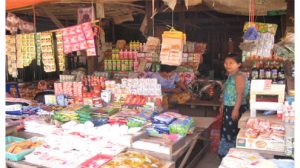
IMNA : Commodity prices have risen at Three Pagoda Pass (TPP) due to ongoing fighting between the Karen National Union (KNU) and Burmese regime soldiers.
Many of the residents, who are daily factory workers, living in TPP are experiencing hardship because of this increase in commodity prices and the shutting down of factories in the TPP area.
Whereas before the fighting began, on November 8th, TPP residents used both Thai and Burmese foodstuffs, Thai brands are no longer affordable.
The fighting has affected food prices because two out of the three trade routes into TPP have been closed. On November 29th, the sea route form Chaung Zone (Kyarinseikkyi) to TPP was closed in preparation for an offensive by Burmese government troops on the KNU soldiers. And now, the road from Thanphyuzayart to TPP has closed by the KNU. The export of goods along this route has stopped, so the goods already at TPP have increased in price due to their current scarcity.
“There have been price increases on rice, oil, onion, garlic, fish paste, chili, and MSG. The price on onions and oil began to increase in December, with coconut oil going from 30 to 55 Thai baht and onions going from 25 to 55 Thai baht,” a female TPP resident explained.
As of now, the transportation of Burmese rice has stopped and TPP residents and daily workers are forced to buy a more expensive brand of Thai rice.
“The price of oil, MSG, onion, garlic and other food has increased, so it’s not profitable anymore to sell Mohinga [Burmese style rice noodle dish],” explained a Mohinga seller at TPP.
TPP used to provide work opportunities in the various factories on the Thai side, but the fighting has closed down many of these factories which produce clothing and furniture leaving the daily workers from Burma with no salaries in conjunction with increased food prices. With fewer factory workers, the local food sellers have experienced a decrease in their profits as well.
The only remaining trade route to TPP is from Ye.

